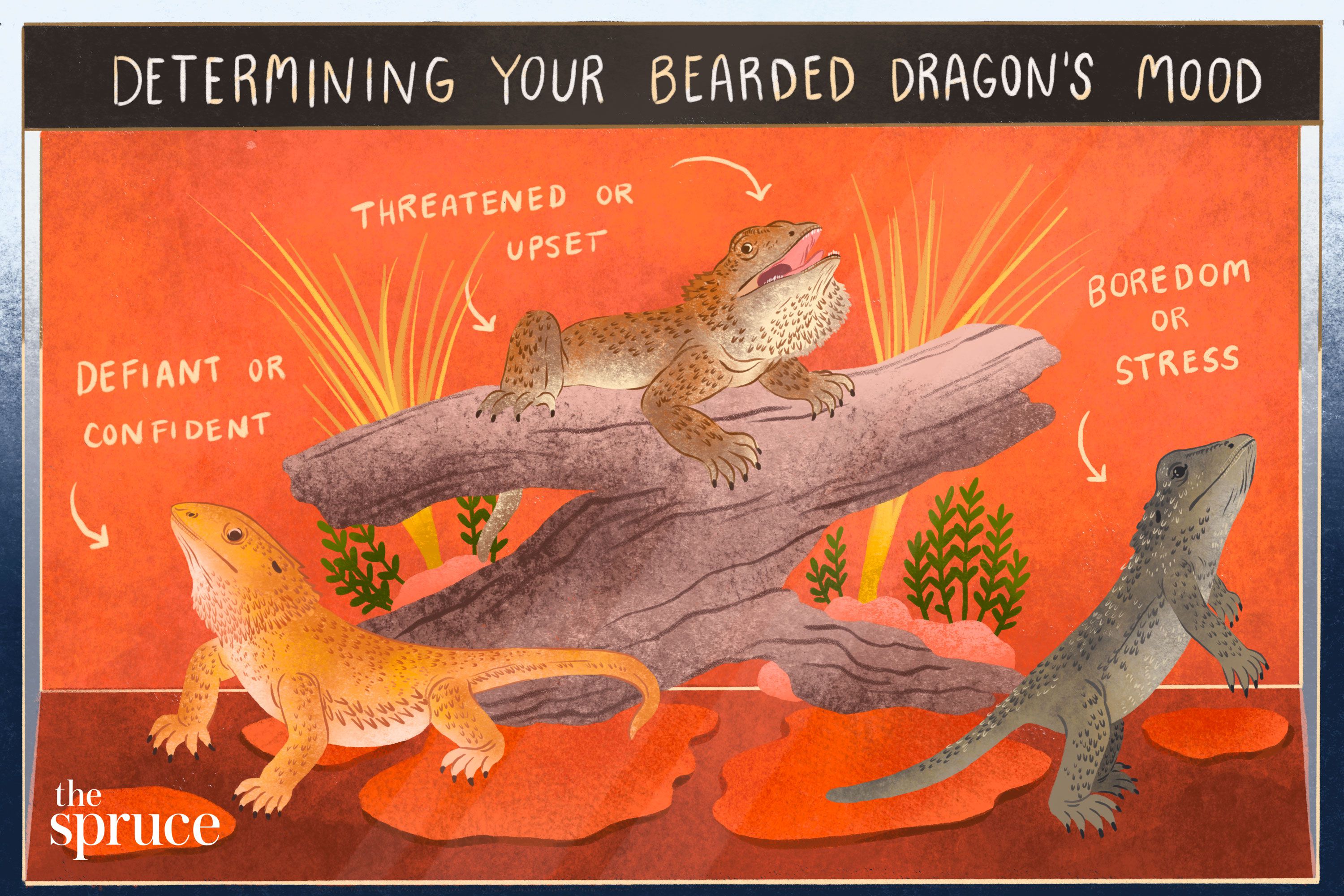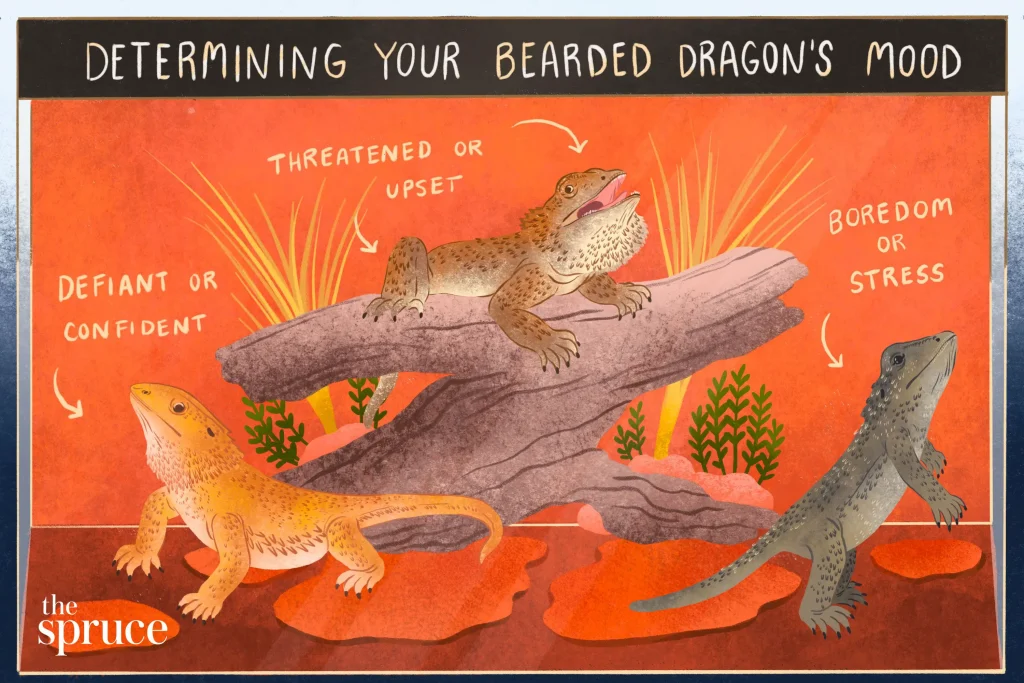Bearded dragons are fascinating reptiles with unique personalities and behaviors. Understanding their body language and health is important for their well-being and your enjoyment of them as pets.
In this article, we will explore the intricacies of bearded dragon behavior, including their body language and communication, as well as their overall health and how to keep them happy and healthy. Whether you are a seasoned bearded dragon owner or considering getting one, this information will be valuable in helping you understand and care for these wonderful creatures.
Understanding Bearded Dragon behavior, body language, and health is crucial for their well-being. These reptiles are social creatures that require enough space to move around, bask, and hide. Signs of a healthy Bearded Dragon include clear eyes, smooth skin, and a healthy appetite. On the other hand, signs of illness include lethargy, sunken eyes, and loss of appetite. Proper care and nutrition, along with regular veterinary check-ups, can help keep your Bearded Dragon happy and healthy.

Understanding Bearded Dragon Behavior, Body Language and Health
Bearded dragons are fascinating creatures that make excellent pets. They are known for their calm and friendly demeanor, making them popular with both novice and experienced pet owners. However, to ensure that your bearded dragon is healthy and happy, it is essential to understand their behavior, body language, and health needs.
Bearded Dragon Behavior
Bearded dragons are diurnal, meaning they are active during the day and sleep at night. They are also territorial and can become aggressive towards other bearded dragons. However, with proper socialization, they can coexist peacefully with other bearded dragons.
They are also known for their basking behavior. Bearded dragons require a basking spot where they can soak up heat and UVB rays to regulate their body temperature and promote healthy bone growth. It is crucial to provide a basking spot that is the right temperature and size for your bearded dragon.
Bearded Dragon Body Language
Bearded dragons communicate through body language, and it is essential to understand what they are trying to convey. When they are happy, they will display relaxed body language, such as a flattened body with legs extended to the side. They may also wave their arms to show submission or excitement.
However, when they are stressed or scared, they may display aggressive body language, such as puffing up their beard, flattening their body, or hissing. It is crucial to monitor your bearded dragon’s body language and provide a safe and comfortable environment to prevent stress.
Bearded Dragon Health
Bearded dragons are generally healthy pets, but they can develop health issues if their needs are not met. They require a balanced diet that includes protein, vegetables, and fruits. It is essential to provide a proper diet to prevent health issues such as metabolic bone disease, obesity, or vitamin deficiencies.
Bearded dragons also require regular veterinary checkups to ensure they are healthy and to catch any health issues early. It is crucial to provide a clean and comfortable living environment to prevent illnesses caused by bacteria or parasites.
Bearded Dragon Benefits
Bearded dragons make excellent pets for many reasons. They are calm and friendly, making them enjoyable companions. They are also low-maintenance pets that do not require a lot of attention. Additionally, they are fascinating creatures that can provide hours of entertainment with their unique behavior and body language.
Bearded Dragon Vs Other Reptiles
Compared to other reptiles, bearded dragons are an excellent choice for novice pet owners. They are less demanding than many other reptiles and are easy to care for. They are also less prone to health issues and can live for up to 15 years with proper care.
Bearded Dragon FAQs
Q: How often should I feed my bearded dragon?
A: Bearded dragons should be fed a balanced diet consisting of protein, vegetables, and fruits 2-3 times a day.
Q: Can bearded dragons live with other reptiles?
A: Bearded dragons can live with other reptiles, but it is essential to monitor their behavior to ensure they are not aggressive towards each other.
Q: How often should I take my bearded dragon to the vet?
A: Bearded dragons should have regular veterinary checkups to ensure they are healthy. It is recommended to take them to the vet at least once a year.
Bearded Dragon Conclusion
In conclusion, bearded dragons are fascinating creatures that make excellent pets. By understanding their behavior, body language, and health needs, you can ensure that your bearded dragon is healthy and happy. Providing a proper diet, a comfortable living environment, and regular veterinary checkups are essential to prevent health issues and ensure that your bearded dragon lives a long and healthy life.
Frequently Asked Questions
How can I tell if my bearded dragon is healthy?
Bearded dragons are generally healthy pets. To ensure your bearded dragon is healthy, check for these signs:
1. Regular bowel movements – bearded dragons should have a bowel movement every 1-2 days.
2. Clear eyes and nose – if your bearded dragon has discharge from their eyes or nose, it could be a sign of infection.
3. Active and alert – healthy bearded dragons are active and alert during the day.
4. Good appetite – bearded dragons are known for their voracious appetites. If your dragon isn’t eating, it could be a sign of illness.
What are some common bearded dragon behaviors?
Bearded dragons are social animals that exhibit many interesting behaviors. Here are a few:
1. Head bobbing – this is a common bearded dragon behavior that can indicate aggression or dominance. It can also be a sign of excitement or happiness.
2. Arm waving – bearded dragons will sometimes wave one arm, which is a sign of submission or greeting.
3. Basking in the sun – bearded dragons need to bask in the sun to regulate their body temperature and absorb vitamin D.
4. Tail twitching – if your bearded dragon is twitching their tail, it could be a sign of excitement or agitation.
What does a bearded dragon’s body language mean?
Bearded dragons use body language to communicate with other dragons and with humans. Here are a few examples:
1. Flattening their body – if your bearded dragon flattens their body against the ground, it could be a sign of submission or fear.
2. Puffing up – bearded dragons will puff up their bodies to make themselves look bigger. This is a sign of aggression or dominance.
3. Black bearding – if your bearded dragon’s beard turns black, it could be a sign of stress or aggression. This is a warning sign that they may bite or lash out if provoked.
What should I do if my bearded dragon is showing signs of illness?
If your bearded dragon is showing signs of illness, it’s important to take them to a veterinarian who specializes in reptiles. Signs of illness can include:
1. Loss of appetite
2. Diarrhea or constipation
3. Lethargy or weakness
4. Abnormal breathing
5. Swelling or discharge from the eyes or nose
Don’t wait to seek veterinary care if you notice any of these symptoms. Reptiles can deteriorate quickly if left untreated.
How can I provide a healthy environment for my bearded dragon?
Bearded dragons require specific conditions to thrive. Here are a few tips for providing a healthy environment:
1. Proper lighting and heating – bearded dragons need access to UVB lighting and a basking spot to regulate their body temperature and absorb vitamin D.
2. A balanced diet – bearded dragons require a diet that includes both insects and vegetables. Avoid feeding them insects that are too large or could cause impaction.
3. A clean habitat – bearded dragons need a clean environment to avoid infections. Clean their habitat regularly and provide a substrate that is easy to clean.
4. Socialization – bearded dragons are social animals that require interaction with their owners. Handle them regularly to keep them tame and healthy.
In conclusion, understanding the behavior, body language, and health of your bearded dragon is essential to ensure its well-being. By closely monitoring your pet’s behavior and body language, you can identify any potential health issues and take proactive steps to address them. Additionally, providing your bearded dragon with a healthy diet, proper lighting, and a comfortable living environment can help promote its overall health and happiness.
It’s also important to remember that bearded dragons are social creatures and require interaction and enrichment to thrive. Spending time with your pet, providing toys and activities, and creating a stimulating environment can all help keep your bearded dragon happy and engaged. With proper care and attention, your bearded dragon can live a long and healthy life as a beloved member of your family.
Finally, if you have any concerns about your bearded dragon’s health or behavior, don’t hesitate to consult with a veterinarian who specializes in reptiles. By working together with your vet and providing your pet with the care and attention it needs, you can ensure that your bearded dragon lives a happy and healthy life for years to come.


